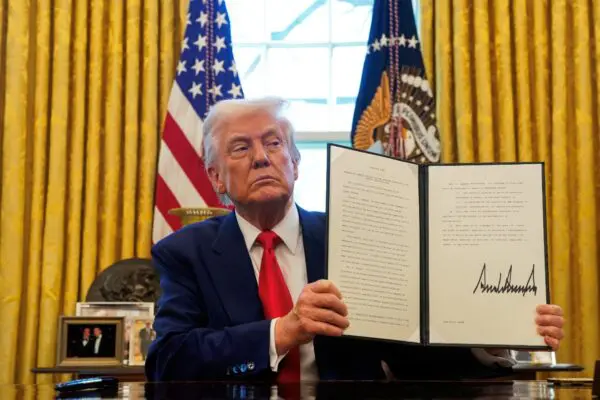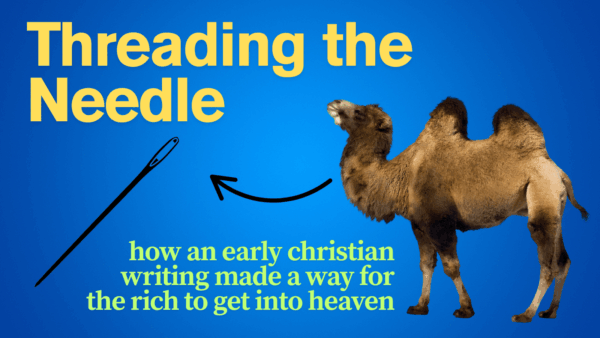Some say we are living in a new Gilded Age. The first Gilded Age, you may recall from your old history textbook, reached its peak in the first quarter of the twentieth century, at the tail end of the Industrial Revolution. A handful of businessmen, bankers, and industrialists enjoyed fabulous wealth (for that era), while most people scraped by only through hard and often unpleasant work.
Today, many political pundits compare the enormous fortunes owned by the likes of Jeff Bezos, Warren Buffett, and Bill Gates to the slow-growing wages of the non-wealthy and conclude that, indeed, we are living in another Gilded Age today.
What are Christians to make of this dramatic inequality? How does the Bible deal with the issue of inequality?
Interestingly, despite being written during a time of high wealth inequality, the New Testament is remarkably silent about the concept. In Luke 6:24, Jesus did pronounce “woe to you who are rich, for you have received your consolation.” But many scholars (NT Wright, Obery Hendricks, and others) have explained that most rich people in first-century Judea procured their wealth through corrupt and oppressive means rather than by adding value to society. The haughtiness of the wealthy in those days, exemplified by Jesus’s parable of the rich man and Lazarus in Luke 16, stands in stark contrast to the disposition Paul exhorts rich believers to manifest in 1 Timothy 6:18—namely, to do good, be rich in good works, and be generous and ready to share. None of this involves force.
Wealth obtained by “unjust gain” is wrong regardless of one’s income level (Prov. 1:19) – rich or poor! “Better is a little with righteousness than great revenues with injustice,” says Proverbs 16:8. Indeed, “Whoever oppresses the poor to increase his own wealth, or gives to the rich, will only come to poverty” (Prov. 22:16). However, wealth gained through hard work, faithful stewardship, and wisdom is a blessing (Prov. 8:12, 18, 20-21; 10:4; 14:24; 15:6). Some measure of inequality, then, is natural, as people have different work ethics, skills, interests, and abilities. And some are simply more fortunate than others.
Is there any degree of wealth inequality that is condemnable in Scripture? Or any level at which the state is called to step in and redistribute wealth in order to narrow the gap? The answer to both is no. Remember, everything in creation ultimately belongs to God. “The earth is the Lord’s and the fullness thereof, the world and those who dwell therein” (Ps. 24:1-2). Humans are mere stewards of what is owned by God. In our dealings and our laws, we should not be biased toward those with a relatively larger or smaller share of stewarded resources. “You must not pervert justice,” says Leviticus 19:15, “you must not show partiality to the poor or favoritism to the rich; you are to judge your neighbor fairly.” Justice, in Scripture, refers only to fairness and lack of prejudice, and thus a bias either against or in favor of the poor would be considered a perversion of justice. “You shall not pervert the justice due to your poor in his lawsuit” (Exod. 23:6), but “nor shall you be partial to a poor man in his lawsuit” (Exod. 23:3).
Believers ought to be mindful of how this principle of impartiality toward rich and poor alike applies not only in our personal lives but also in government policy. Some government laws and regulations overwhelmingly harm the economically vulnerable to the benefit of the well-off. Think, for example, of occupational licensing laws that create an oppressively high barrier to entry for newcomers. Think also of the special federal, state, or local tax subsidies offered to big businesses that benefit large companies at the expense of smaller companies and average taxpayers. Both of these practices of government overwhelmingly benefit market incumbents and the already-wealthy at the expense of everyone else.
Even these two issues combined, however, pale in comparison to the degree to which monetary policies have exacerbated wealth inequality. Now, I know the term “monetary policy” strikes many as arcane and academic, and most people are not fully sure what central banks even do. But stick with me here.
The Federal Reserve (the “Fed”), the central bank of the United States, controls the interest rate that banks charge each other for overnight loans as well as the rate that the Fed pays to banks for reserve deposits. This ultra-short-term interest rate is one of the primary determinants of longer-duration rates. Thus, Fed policy decisions have a profound effect on all other interest rates in the economy, from mortgage rates to auto loan rates to the rates that big businesses pay on their debt. Lower interest rates, all else being equal, act as a boon to the prices of various assets like stocks and real estate, which are often partially purchased with debt. In the past decade, the Fed has attempted to spur economic growth through a “wealth effect”—that is, they have used monetary policy to purposely raise asset prices in order to make people feel richer and more willing to spend money, thus boosting the economy.
The problem? As I explained in
a recent article on the investment website Seeking Alpha, various income levels and generations have different investment preferences. Lower income-earners and Millennials are significantly more likely to distrust stocks and real estate, even in a world where the barriers to buying these assets are falling as transaction costs plummet. These groups overwhelmingly prefer to stash their money in savings accounts instead. Meanwhile, higher-earners and Baby Boomers are significantly more likely to invest in stocks and real estate. In fact, higher-earning Boomers are likely to have held these assets for a long time.
As Fed policy decisions have increasingly lent support to asset prices over the last few decades and especially over the past decade, the result has been to massively boost the wealth of the already-wealthy and Boomers at the expense of the non-wealthy and Millennials. The result, as depicted in the chart above, has been a decrease in the wealth share of the non-wealthy (the bottom 90% of earners) since interest rates were relatively high in the 1980s. On one hand, the lower-earners, who prefer to keep their money in savings accounts, saw the interest income from their savings diminish to almost nothing over the decades. And on the end of the spectrum, higher-earners enjoyed a huge boost in their preferred investments from artificially low interest rates. The income-generation from savings accounts fell while capital gains and business profits, fueled by lower costs of debt, soared.
And, as mentioned previously, this was done on purpose. Central bankers knew the effect that it would have, and they chose to make these policy decisions anyway in an attempt to spur economic growth that would inevitably benefit the wealthy dramatically more than the non-wealthy. How else can Christians interpret this agenda besides a form of favoritism toward the rich and prejudice against the poor?
While there’s nothing unbiblical about inequality per se, there is something unjust about inequality that has been caused and compounded by purposeful government policy decisions. Christians who want to stand for justice, then, ought to also stand against the reigning monetary regime at the Federal Reserve.
“The rich and the poor meet together; the Lord is the Maker of them all” (Prov. 22:2).




), //libertarianchristians.com/wp-content/plugins/smartquizbuilder/includes/images/template6-latest.jpeg))

), https://libertarianchristians.com/wp-content/plugins/smartquizbuilder/includes/images/template6-latest.jpeg))


;?>/smartquizbuilder/includes/images/sqb-registration-img.jpg)




